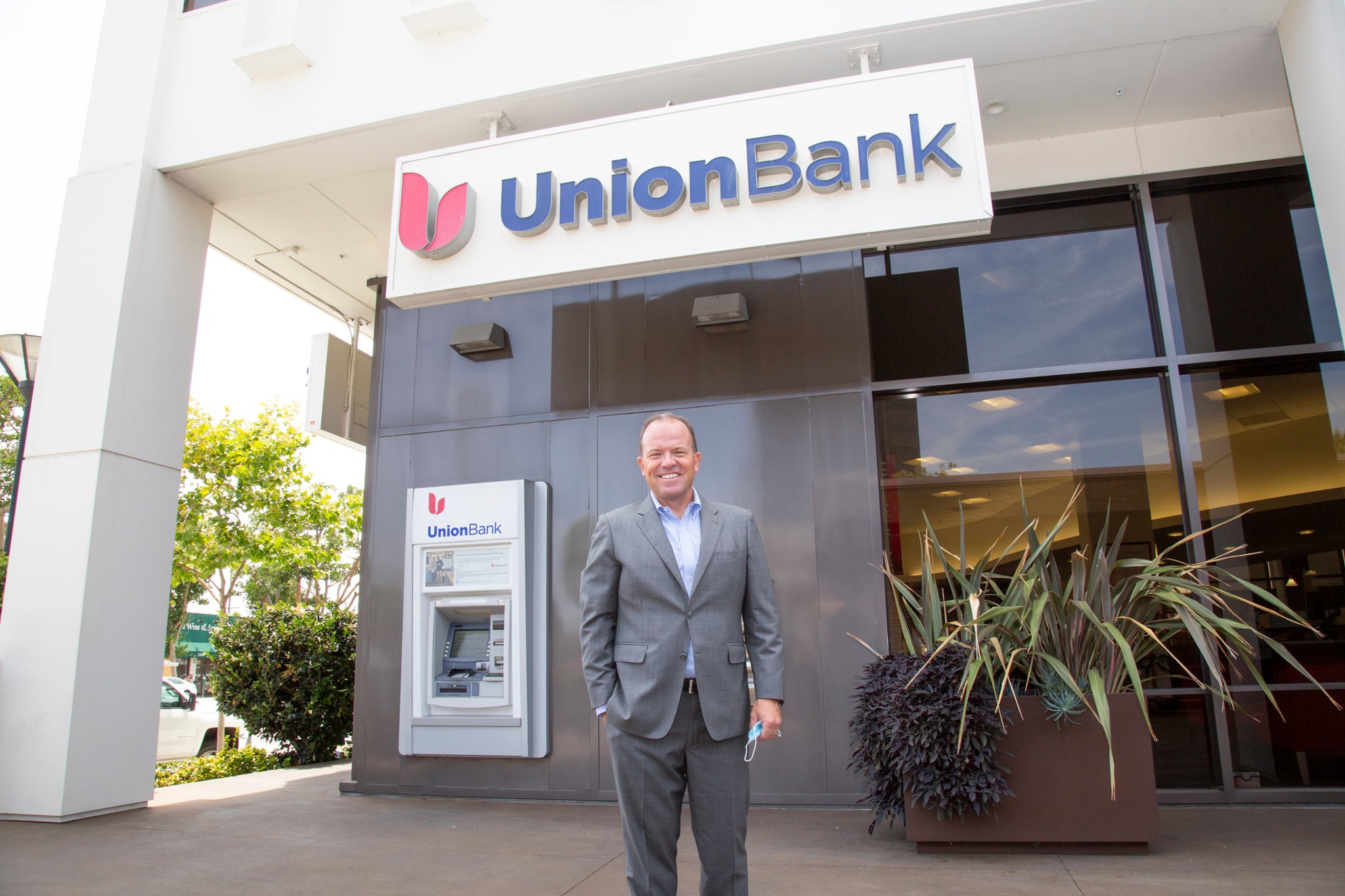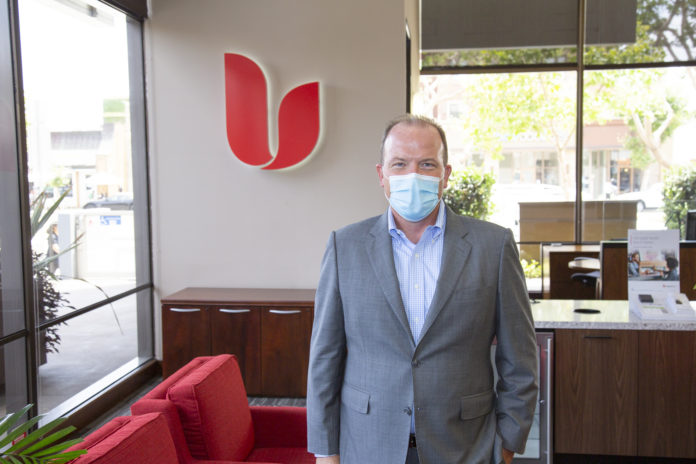Like many executives in his industry, Greg Seibly is a career banker.
The Lodi native has held leadership positions at major banks, including Wells Fargo & Co., Bank of America and U.S. Bancorp.
He has led corporate turnarounds as chief executive of Sterling Financial Corp. — later merged with Umpqua Holdings Corp. — and as CEO of the Federal Home Loan Bank of San Francisco.
Seibly stepped into his current role as president of MUFG Union Bank at one of the most difficult economic moments in modern history. His first day was March 2, just weeks before the Covid-19 pandemic forced California to enter a sustained shutdown that has stretched nearly six months so far.
Seibly has spent nearly all of his tenure as Union Bank’s Los Angeles-based president working remotely, forced to rapidly devise new ways to lead his team virtually under the pandemic paradigm.
The Business Journal caught up with Seibly at his home office to find out how he and his bank have been faring in the new normal.
Before we jump into the impact of Covid-19 on your new role, could you share a bit about how you first got into banking?
Out of college, I went to work at a company called PNC Bank. I thought it would be a great training ground for graduate school.
At that point in time, banks had a lot of those kinds of training programs.
What was it about banking that resonated with you?
Seeing all the different types of businesses you deal with, seeing the dreams that bankers help people realize through things like vehicle loans and home loans, being part of that and living that every day, I just grew to love it. Thirty-three years into my career, I love it as much today as I did then.
Were there any particular influences that shaped the way you work and lead today?
My dad’s background was a big influence in terms of being a jurist and knowing you have a responsibility to make sure you are doing the right thing. My mom was a businesswoman and really a pioneer. Her being in the first class of MBAs at Michigan State was not something that her parents necessarily supported. That showed me the need to keep pushing toward your goals even when people don’t expect you to. My maternal grandfather also played a role. He was in construction. I worked with him every summer growing up. That taught me about hard work. It also taught me that I really didn’t want to be a mason.
The pandemic hit just after you started this job. What was that adjustment like?
My first 100 days (at Union Bank) certainly weren’t at all what I envisioned when I was interviewed for the job. We became big Webex and (Microsoft) Teams users.
What steps did you and the team take?
We made it a very purposeful journey together and decided that we were going to hold a set of daily communication and briefing meetings. Every day at 4 p.m., we set up a bringdown of how everything was going, everything from colleague experience, colleague safety, client experience. It really gave us a holistic way over the course of four months to jell as a team.
What was the mood like on those calls? How did the team engage?
People would virtually never come on in a suit and tie. Some people would say, “I haven’t showered today.” That was a bit too much information, but the energy was good. It was refreshing because we met each other as humans. It really helped us come together quite fast. If it hadn’t been for Covid, I don’t know if we could have ever come together that fast. The progress we’ve made until today has given me great hope for the future coming out of this.
Do you think you’ll be carrying any of those practices and processes into the eventual post-Covid world?
We’ll carry some forward. We think these virtual calls will always be great tools. Some subset of our teams will be back for work (in the office) full time (while) 25% or 30% may always work from home. Flexible use of space for us will always be important. It gives us flexibility for internal things as well as for our client meetings.

How has this new paradigm changed the way your team engages with clients?
I think this has sharpened up our listening capabilities. You think about a small business owner that works 6 a.m. to 6 p.m. The evening hours are their prime hours to work with their adviser. They would much rather work with us then and on the weekends. So, some of those off hours, we are turning those into on hours. For our colleagues, we are looking at more flexible schedules. The schools shutting has been something our employees have on their minds. If we bring those two together, there could be a better fit (in schedules).
How has this affected your physical branch networks?
We are seeing high branch traffic. We find that a lot of people come into our branches for reassurance and some sense of normalcy. We have 337 branches in total. Right now, 40 of them are temporarily shuttered. We took those offline to create more flexibility in our staffing. We have limited lobby access, using drive-ups where we can.
What has the bank done to help employees at those branches?
We’ve created support programs for our branch staff. That has included 10 additional days off and about $500 additional pay per employee in the branch from March through June. We are also figuring out more flexible working plans.
What kind of effects are you seeing on your digital platforms?
One of the things we have done in our marketing materials and the website is to encourage people to meet us digitally or virtually. We have jumped forward five years in the last five months in terms of digital utilization. We are going to be doubling down on a number of technology enhancements over the next two to three years to ensure we are bringing our capabilities up to a higher level — meeting our clients where they want to be met.
Before you officially joined, MUFG Americas Chief Executive Steve Cummings said one of your core focuses would be to help Union Bank better contend with global banks in the region. How has that been going?
We think that a lot of the news in the coming years will be major bank names pulling back and cutting costs in the region. We want to lean into that and take advantage of those opportunities.
Can you share any specifics?
We just completed the formulation of a new strategic plan that will carry us through 2023. Part of the plan will be focused on having a more distinctive digital experience. We’ll also be looking at what our physical delivery platform looks like. In the post-Covid world, we want to look at how we right-size things, make the experience more modern, more intimate.
What are your top priorities for the rest of this year and into 2021?
As we go forward, we are positioning ourselves to be the premier regional bank in the West. Our objective is to make sure that we keep doing all of the things that we need to do to compete aggressively for that title. We will be moving forward rapidly on some of the changes coming out of our strategic plan. We’ll be focused on being here for our clients and being trusted advisers.
How do you think it’s going so far?
I’ve been here for five months, so there is only so much you can do, but I’m proud of our progress.

